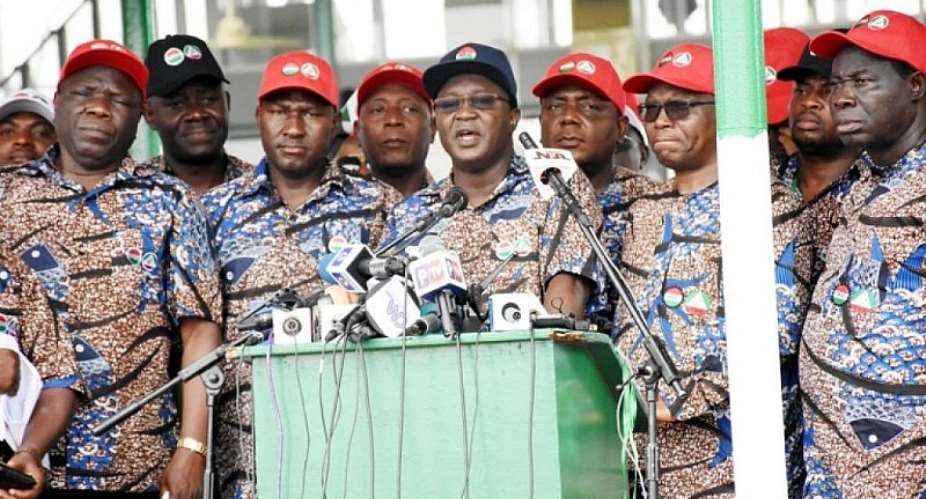Nigerian workers celebrated Labour Day with renewed enthusiasm this year, following the recent signing into law of a new National Minimum Wage of 30,000 Naira (74 euros). But final victory is still some distance away.
The country's labour unions have been battling against Nigerian governments for years to secure the 67 percent increase on the basic salary. It had stood at 18,000 Naira.
The new law, which came into effect on its signing by President Muhammadu Buhari on April 18, is applicable to both the public and private sector. It has a flexibility clause for smaller businesses employing fewer than 25 people.
But, just days after the signing, comments in the Nigerian newspapers were not about the feel good spirit sweeping through the unions after their great victory but instead about the reservations of State governments who are charged with implementing the flagship reform of the Buhari administration.
Vanguard reports that getting stakeholders at all levels to pay the NMW will take another gargantuan round of struggles. According to the newspaper, a holistic implementation will be a tough call, as the economy is still tottering just above recession and new governments are set to be sworn in on May 29.
Daily Post takes up calls by some of the newly-elected State Governors for greater clarification from the Federal government about the modalities of implementation, considering their frail internal capabilities to generate the revenue needed to finance their budgets.
The clamour for increased subsidies from the so-called “dependent States” comes as President Buhari prepares for the inauguration of his second 4-year term.
It's an issue on which the grumbling Governors are ready to stake their political careers, says Abubakar Kari, an economics lecturer at Abuja University.
He claims that that up to 11 states were unable to pay the full salaries of its workers under the previous 18,000 Naira minimum wage base, some resorting to dishing out percentages of workers' salaries to prevent a shutdown.
Dr. Kari says the Governors' frustrations were compounded by a rejection of the 24,000-Naira offer they put on the table as a compromise, during the tripartite wage talks with the unions and the Federal Government.
This is added to Abuja's refusal to increase the shares of the so-called “dependent” States in the 617 billion Naira allocated to Nigeria's 36 States from the Federation account, which they badly need to cushion the new 30,000 Naira base pay.
It's worth noting that States like Bauchi, Borno, Gombe, Nassarawa, Yobe, Zamfara and others each generate less than 6 billion Naira annually in terms of internal revenue. This, as opposed to Lagos with an IGR of 268 billion Naira, far more than the 245 billion Naira made by Nigeria's nine other richest states combined.
According to the Nigerian economist, President Buhari's government is unlikely to heed the Governors' calls for more budget support due to the constitutional arrangements on the sharing of national revenue.
In the interview with RFI, Dr. Kari also discussed sanctions prescribed in the Minimum Wage Act for State or local government officials who fail to apply the law.
“Anybody who refuses to pay the NMW will face the wrath of the law” said the Abuja University economics lecturer.
Kari however predicts more rounds of labour unrest over the reform. As he puts it, “while the chapter of agitation for a new minimum wage has been close, the struggle for a faithful and strict implementation of this minimum wage has been opened”.





 Whoever participated in the plunder of the state must be held accountable – Jane...
Whoever participated in the plunder of the state must be held accountable – Jane...
 A vote for John and Jane is a vote to pull Ghana from the precipice of destructi...
A vote for John and Jane is a vote to pull Ghana from the precipice of destructi...
 I’ll repay your abiding confidence with loyalty, understanding and a devotion to...
I’ll repay your abiding confidence with loyalty, understanding and a devotion to...
 ‘I’ve learnt deeply useful lessons for the future' — Serwaa Amihere breaks silen...
‘I’ve learnt deeply useful lessons for the future' — Serwaa Amihere breaks silen...
 I’m sorry for the embarrassment – Serwaa Amihere apologises for leaked sex video
I’m sorry for the embarrassment – Serwaa Amihere apologises for leaked sex video
 Dumsor: Matthew Opoku Prempeh not in charge of Energy sector – Minority
Dumsor: Matthew Opoku Prempeh not in charge of Energy sector – Minority
 Adu Boahen’s murder: Police arrest house help who was in possession of deceased’...
Adu Boahen’s murder: Police arrest house help who was in possession of deceased’...
 Akufo-Addo nominates Felicia Attipoe as Tema West MCE
Akufo-Addo nominates Felicia Attipoe as Tema West MCE
 Election 2024: I can't have someone I defeated twice as my successor – Akufo-Add...
Election 2024: I can't have someone I defeated twice as my successor – Akufo-Add...
